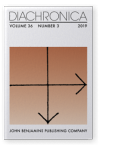The role of atypical constellations in the grammaticalization
of German and English passives
In this paper we propose an alternative scenario for the
grammaticalization of passive constructions in German and English. According to
the received view, the development starts with the frequent combinations of
copula verbs with past participles, which then increasingly gain in frequency
during the grammaticalization process. In contrast to the received view, we
argue that marginal – i.e., atypical and infrequent – constellations of
constructions play an important role in the grammaticalization process. These
constellations are ambiguous in their interpretation, and consequently have an
inherent potential to trigger semantic reinterpretation and syntactic
reanalysis. The alternative scenario is more consistent with theoretical
considerations and the patterns in corpus data of German and English between
1050 and 1350. Our paper supports the hypothesis that the grammaticalization of
the passive in German started from constellations of the become copula
with past participles of atelic verbs, i.e., activities and semelfactives. By
contrast, no such change can be observed in the corresponding construction in
English. We discuss the implications of our findings for constructional change
and grammaticalization in general.
Article outline
- 1.Introduction
- 2.The grammaticalization of passive constructions in English and
German
- 3.Grammaticalization of German and English passives: An alternative
view
- 3.1Background
- 3.2Source constructions
- 3.3Resolution of mismatch: Hypotheses
- 4.Data
- 5.Analysis
- 6.Discussion
- 7.Conclusion
-
Acknowledgements
- Notes
-
References
References (42)
Agresti, Alan
2007 An introduction to categorical data analysis. 2nd edn. Hoboken, NJ: Wiley-Interscience.


Asher, Nicholas
2011 A web of words: Lexical meaning in context. Cambridge: Cambridge University Press.


Cohen, Ayala
1980 On the graphical display of the significant components in two-way
contingency tables.
Communications in Statistics: Theory and Methods 9(10). 1025–1041.


De Smet, Hendrik
2012 The course of actualization.
Language 881. 601–633.


Filip, Hana
2012 Lexical aspect. In
Robert I. Binnick (ed.),
The Oxford handbook of tense and aspect, 721–751. Oxford: Oxford University Press.

Flach, Susanne
Forthcoming.
From movement into action to manner of causation: Changes in argument mapping in the into-causative.
Linguistics.
Gaeta, Livio
2018 Im Passiv sprechen in den Alpen. In
Elena Smirnova &
Robert Mailhammer (eds.),
Aktuelle Ansichten zur Synchronie und Diachronie von
Passivkonstruktionen. Special Issue of Sprachwissenschaft 43(2). 221–250.

Gehrke, Berit
2015 Adjectival participles, event kind modification and
pseudo-incorporation.
Natural Language and Linguistic Theory 33(3). 897–938.


Goldberg, Adele
1995 Constructions: A construction grammar approach to argument
structure. Chicago: University of Chicago Press.

Goldberg, Adele
2006 Constructions at work: The nature of generalization in language. Oxford: Oxford University Press.

Harris, Alice C. & Lyle Campbell
1995 Historical syntax in cross-linguistic perspective. Cambridge: Cambridge University Press.


Haspelmath, Martin
1999 Why is grammaticalization irreversible? Linguistics 37(6). 1043–1068.


Helbig, Gerhard & Joachim Buscha
2001 Deutsche Grammatik: Ein Handbuch für den Ausländerunterricht. Berlin: Langenscheidt.

Hopper, Paul J. & Elizabeth C. Traugott
2003 Grammaticalization, 2nd, revised edn. Cambridge: Cambridge University Press.


Jackendoff, Ray
1997 The architecture of the language faculty. Cambridge: MIT Press.

Jones, Howard
2009 Aktionsart in the Old High German passive with special reference to the
Tatian and Isidor translations. Hamburg: Buske.

Klein, Thomas, Klaus-Dieter Wegera, Stefanie Dipper, & Claudia Wich-Reif
2016 Referenz-korpus Mittelhochdeutsch (1050–1350),
Version 1.0,
[URL]. ISLRN 332-536-136-099-5.
Kotin, Michail L.
2003 Die werden-Perspektive und die werden-Periphrasen im Deutschen. Frankfurt a.M.: Peter Lang.

Lauwers, Peter & Dominique Willems
2011 Coercion: Definition and challenges, current approaches, and new
trends.
Linguistics 49(6). 1219–1235.


Lightfoot, David
1979 Rule classes and syntactic change.
Linguistic Inquiry 101. 83–108.

Maienborn, Claudia
2007 Das Zustandspassiv: Grammatische Einordnung –
Bildungsbeschränkung – Interpretationsspielraum.
Zeitschrift für Germanistische Linguistik 351. 83–114.


Mailhammer, Robert & Elena Smirnova
Meyer, David, Achim Zeileis & Kurt Hornik
2003 Visualizing independence using extended association
plots.
Proceedings of the 3rd International Workshop on Distributed Statistical
Computing, 1–8.
[URL]
Meyer, David, Achim Zeileis & Kurt Hornik
2016 vcd: Visualizing categorical data.
R package version 1.4-3.

Michaelis, Laura A.
2004 Type shifting in Construction Grammar: An integrated approach to
aspectual coercion.
Cognitive Linguistics 151. 1–67.


Moens, Marc & Mark Steedman
1988 Temporal ontology and temporal reference.
Computational Linguistics 14(2). 15–28.

Nübling, Damaris
2000 Prinzipien der Irregularisierung: Eine kontrastive Untersuchung von zehn
Verben in zehn germanischen Sprachen. Tübingen: Narr.


Partee, Barbara & Mats Roth
1983 Generalized conjunction and type ambiguity in meaning, use and
interpretation of language. Berlin: Walter de Gruyter.

Petré, Peter & Hubert Cuyckens
2009 Constructional change in Old and Middle English copular
constructions and its impact on the lexicon.
Folia Linguistica Historica 301. 311–366.

Petré, Peter
2014 Constructions and environments: Copular, passive, and related
constructions in Old and Middle English. Oxford: Oxford University Press.


R Core Team
2019 R: A language and environment for statistical computing. R Foundation for Statistical Computing, Vienna, Austria. URL
[URL]
Rapp, Irene
1996 Zustand? Passiv? – Überlegungen zum sogenannten
„Zustandspassiv“.
Zeitschrift für Sprachwissenschaft 15(2). 231–265.


Schirmunski, Victor
1962 Deutsche Mundartkunde. Vergleichende Laut- und Formenlehre der deutschen
Mundarten. Berlin: Akademie-Verlag.

Smith, Carlota
1997 The parameter of aspect. 2nd edn. Dordrecht: Kluwer.


Sonnenhauser, Barbara
2006 Yet there’s method in it: Semantics, pragmatics and the interpretation
of the Russian imperfective aspect. Munich: Sager.

Toyota, Junichi
2008 Diachronic change in the English passive. Houndmills: Palgrave Macmillan.


Wiemer, Björn
2011 The grammaticalization of passives. In
Bernd Heine &
Heiko Narrog (eds.),
The Oxford handbook of grammaticalization, 535–546. Oxford: Oxford University Press.

Ziegeler, Debra
2007 A word of caution on coercion.
Journal of Pragmatics 39(5). 990–1028.


Cited by (1)
Cited by 1 other publications
Flach, Susanne
2021.
From movement into action to manner of causation: changes in argument mapping in the into-causative.
Linguistics 59:1
► pp. 247 ff.

This list is based on CrossRef data as of 1 july 2024. Please note that it may not be complete. Sources presented here have been supplied by the respective publishers.
Any errors therein should be reported to them.
